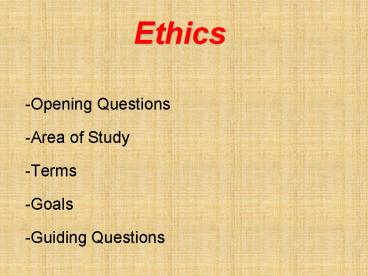Ethics - PowerPoint PPT Presentation
1 / 8
Title:
Ethics
Description:
Ethics-Opening Questions-Area of Study-Terms-Goals-Guiding Questions Opening Questions 1). How do you know if you ve made a morally right or morally wrong decision? – PowerPoint PPT presentation
Number of Views:112
Avg rating:3.0/5.0
Title: Ethics
1
Ethics
- -Opening Questions
- -Area of Study
- -Terms
- -Goals
- -Guiding Questions
2
Opening Questions
- 1). How do you know if youve made a morally
right or morally wrong decision? - 2). What is more important in evaluating the
morality of an action ones intention or the
result of ones action? - 3). Should one act Morally? Explain why/why not.
3
Areas of Study
- -Ethics is the study of right and wrong. In
Ethics, one examines questions of value. - -Not searching for truth or ultimate reality.
- -This topic asks us to search for the best way to
live our lives.
4
Terms
- Morality a set of principles or rules that guide
our actions. - Duty What one ought to do (or not do) based upon
ones position or moral principal - Ethics set of principles and aims that allow us
to live with clarity and confidence (sensible) - Good Life The reason to develop moral philosophy
(the reason to accept moral principles and rules)
5
Terms Continued
- Duty Defined Morality Moral framework based upon
principles that must not be broken or must be
followed Morality is determined by the principle
itself, not the results. - Consequentialist Theories Moral Framework based
upon the result of actions No rule must be
followed, instead good results determines that
morality of decisions.
6
Terms Continued
- Relativism Belief that morals change from
society to society, time period to time period. - Absolutism Belief that there are some morals
that do not change over time or in different
contexts.
7
Goals of the Unit
- Goals
- -Understand the different moral frameworks in
philosophical history - -Evaluate your own framework for determining
right and wrong - -Understand the difference between
relativism/absolutism duty-defined/consequentiali
st theories
8
Guiding Questions
- 1). Who is the most moral person you know?
- 2). What makes this person moral in your
opinion? - 3). Are there any moral codes in your society
which you feel are wrong/cruel/immoral? - 4). What is a moral belief that you hold?
- 5). What is a moral principle that you believe
everyone should follow?































